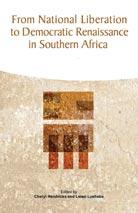From National Liberation to Democratic Renaissance in Southern Africa
Keywords:
National Liberation, Democratic Renaissance, Southern Africa, colonial ruleSynopsis
“This collection provides a set of original essays that collectively enrich and move our understanding of Southern African societies in exciting new directions. The volume brings together an interdisciplinary team of younger and older scholars whose contributions deconstruct the dominant discourses in Southern African studies by vigorously reexamining the complex processes of national liberation and the challenges of post-liberation identity politics, democratization, and social transformation. It captures, compellingly, the historical forces and contemporary dynamics that unite, divide, and differentiate this fascinating and multifaceted region.”
“This collection of essays is one of the most important contributions to the ongoing debate on some key aspects of the recent history and politics of Southern Africa. Unlike many texts which reduce the discussion of Southern Africa to that of South Africa, this volume examines the process of democratization and state transformation from a broad regional perspective. Stakeholders at the grassroots level, particularly in civil society, are given a voice which highlights their contributions to the ever-changing political landscape of the region. The editors have done a masterful job in weaving together essays that critically examine democratization in the Southern Africa region with an eye to the lessons learned, and their application to the rest of the continent. This is a valuable addition to the literature on democracy in Africa.”
The collection of papers captured in this volume offer fresh, important and critical insights into our understanding of contemporary Southern Africa in transition. Anybody who wishes to understand the region is advised to read this book
From National Liberation to Democratic Renaissance in Southern Africa broadly engages the region’s political and cultural economies and, in particular, the ways in which the legacies and the nature of the liberation movement imprint on post-liberation patterns of change and on continuing challenges. The authors draw on current discourses and theoretical interventions to revisit national liberation struggles and to address issues of identity, post-liberation state-building and democratisation. Case studies from Botswana, South Africa, Swaziland and Zimbabwe reflect concerns pertinent to the whole region, i.e., social transformation, reconciliation, democratic governance, the politics of race, ethnicity, gender and nationalism. Collectively, the chapters provide the reader with insights into current debates and practices in the region.
Chapters
-
Prelim
-
Introduction: Southern Africa – Continuities and Disjunctures in the Discourse and Practices
-
Swaziland and South Africa Since 1994: Reflections on Aspects of Post-Liberation Swazi Historiography
-
Problems and Prospects of Democratic Renewal in Southern Africa: A Study of Statecraft and Democratisation in South Africa, 1994-2003
-
Legacies and Meanings of the United Democratic Front (UDF) Period for Contemporary South Africa
-
The 1987 Zimbabwe National Unity Accord and its Aftermath: A Case of Peace without Reconciliation?
-
Race and Democracy in South Africa
-
From Apartheid Social Stratification to Democratic Social Divisions: Examining the Contradictory Notions of Social Transformation between Indian and Black South Africans
-
Negotiating Nationalism: Women’s Narratives of Forced Displacement
-
Wilgespruit Fellowship Centre: Part of Our Struggle for Freedom
-
Curfew and the ‘Man in the Middle’ in Zimbabwe’s War of Liberation with Special Reference to the Eastern Areas of Zimbabwe, 1977-1980
-
‘Your Obedient Servant or Your Friend’: Forms of Address in Letters Among British Administrators and Batswana Chiefs
Downloads






